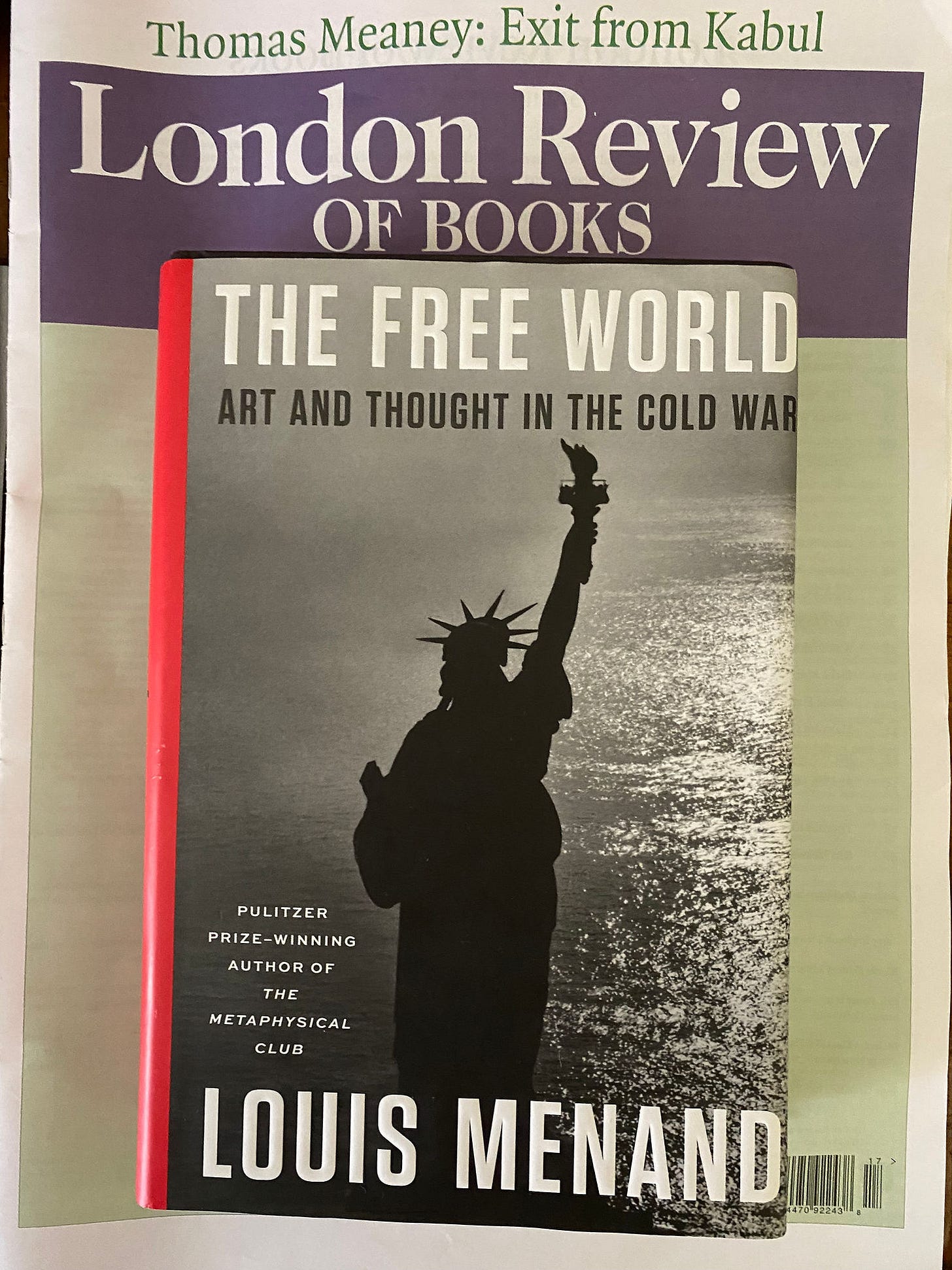Review of THE FREE WORLD: Art and Thought in the Cold War
A breathtaking, dizzy tour of an under appreciated cultural golden age ...
This is a BIG book in every sense. I skimmed parts of it and really wish it had been trimmed in places with text replaced with more photos! The purpose of the book is briefly introduced at the start by Menand but, in the end, it is less a thematically driven work and more a descriptive, very in-depth tour of the intellectual history of the Cold War from the perspective of the West, in particular the United States. If one recognizes that Menand’s enormous erudition is served first and foremost for this broader purpose, then it is a terrific long-term resident on your bedside stack of books. Just be sure to read it in the morning with a cup of coffee on your right and Google on your left. The following is a typical bullet point approach I default to when trying to capture a vast text like The Free World. The points reflect where and what I wrote on the margins as I read a book that so often left me in a state of disbelief that one person could put such a thing together.
The book is a denser version of Halberstam’s The Fifties in that it is structured around dozens of biographies that are themselves connected to a myriad of mini biographies. I loved the best of the biographies but was frequently frustrated by others and almost always thought they were too long. Regardless, if any of the following are in your wheelhouse of interest, his treatments are fascinating. I have tried to rank them according to how much I took from them (remember … this book can and should be read over time).
The Biographies: (maybe 50% of the book)
The Beatles (blew me away)
Lionel Trilling (if lit is your thing)
Jackson Pollock (thrilling just like his paintings)
Hannah Arendt (wish I had known her)
Jean Paul Sartre (you will get a handle on existentialism)
James Baldwin (along with Richard Wright … the role of Paris remains overlooked)
George Kennan (gets the ball rolling)
George Orwell (the oracle)
Fun to Know: (a very short version of very long list)
A definition of Pop Art
The importance of Comic Books
Why there were so many English majors among the Boomers
Why The Family of Man photo album was on every coffee table at one point
“Driving a car” freedom and how it explains so much
Why the Beats and what happened to them
The BIG takeaways among so many in his BIG book:
The extraordinary role of the Jews who fled Germany and other parts of Europe in the early to mid-20th century in the post WWII development of the West and in particular the United States. Hard to imagine a smaller collection of individuals with a greater impact on the world than the Jews who fled Europe, often barely making it out alive, fleeing to democracies that all too often tried to keep them out.
The Cold War is most often framed in political, ideological or military contexts. The fall of the Soviet Union is usually framed in all the above within an overarching economic context. What this book brings to light so clearly and persuasively is that it was also a cultural war. Economics and culture are related but it becomes clear how the United States was a cultural empire as much as it was an economic one. This remains the case today even if the stage is getting a bit crowded.
The story – both the book and the story itself – is a very WHITE one … particularly a WHITE MALE one. I do not think Menand is doing anything wrong here. With many exceptions, it generally was just such a world. One feels a hegemonic presence that both gave and very much withheld. One also feels the muscular, immature presence of the male ego throughout the book. This is coming from a writer (me) who is likely standing in a glass house of his own making.
Speaking of muscular presence … this book is an intricate and vast portrait of the brain and circulatory system of the American Empire. Europe is there but is Sancho Panza to America’s Don Quixote – take that as you will. You feel a nation at its most creative, reshaping everything within and without. While Menand’s America is a deeply troubled country, it is also the country that is on its way to winning the third world war of the 20th century. What too often gets lost is what might have happened to this world without this messy democracy and its terrible list of original and present sins. Without raising a single flag or blowing a single trumpet, Menand gives us a taste of a full-bodied wine in a glass that is half-filled.
The Free World: Art and Thought in the Cold War
Louis Menand (2021)
737 pages


